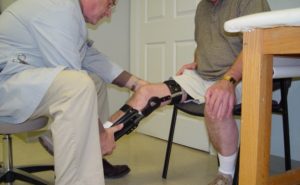If you have been diagnosed with diabetes, you are undoubtedly aware of the complications that can arise to interfere with your daily life — including lower limb amputation. Do you know how high the risk of amputation is in people with diabetes?
According to the American Diabetes Association, a person loses a limb due to diabetes-related complications every 30 seconds. Diabetes can turn even minor health issues into severe problems.
At Horton’s Orthotics & Prosthetics, we make custom orthotics to prevent amputation in both diabetic 1 and 2 patients. Our diabetic shoes and custom orthotic inserts can help with certain risk factors and complications of diabetes, although self-care is essential to healthy feet.
Factors That Predispose Diabetics to Amputation
When you know what can predispose you to lower limb loss, you can take proper preventative measures. You should pay particularly close attention to these five factors:

High Blood Sugar
When living with diabetes, maintaining healthy blood sugar levels is critical. When your blood sugar increases, your white blood cells have a hard time fighting bacteria. An injury, even a small cut, takes much longer to heal.
Such injuries open the door to infections, potentially leading to a loss of limb.

Diabetic Neuropathy
Neuropathy is nerve damage that often results in a loss of sensation in your feet. This happens when blood sugar levels are too high for a long time.
If you suffer an injury while experiencing neuropathy, you may not even feel it. More importantly, you may not know when an infection occurs. You can break a bone in your foot without feeling the accompanying pain and keep walking around like nothing is happening — making the fracture even worse.
A broken bone can negatively affect your foot’s soft tissue, causing a deformity known as Charcot’s foot. This condition requires surgery or, in severe cases, amputation.
Diabetic shoes and custom orthotic inserts can prevent nerve damage and are a great help if you have diabetic neuropathy.

Poor Blood Flow
Similarly to high blood sugar, poor circulation prevents your body from properly combating infections. Many individuals living with diabetes have poor circulation, especially if steps are not taken to manage the issue.
Diabetes causes the blood vessels to tighten and shrink, often causing peripheral arterial disease (PAD). PAD develops as a result of poor blood flow in the feet.

Corns, Calluses, and Ulcers
Untreated corns and calluses often lead to foot ulcers. If you ignore an ulcer, it may cause an infection, again resulting in limb loss. Just like with injuries, you may not even know you have an ulcer if you lose sensation in your feet.
Uncomfortable footwear can cause corns, calluses, and ulcers; diabetic shoes and custom orthotic inserts can help prevent their development.

Smoking
If you smoke cigarettes, the nicotine causes your blood vessels to tighten and narrow. Your blood cannot spread enough oxygen throughout your body. Cigarette smokers develop poor circulation, whether or not they are a diabetic.
Narrow blood vessels, however, are a more serious problem for diabetics, because of their body’s inability to fight infections properly.
How to Prevent Foot Problems and Amputations
It all comes down to you. Taking excellent care of your body can prevent serious complications that lead to amputation. Certain vital steps could save your life or limbs.
1. Maintain Good Foot Hygiene
When it comes to washing your feet, you can’t skip a day. Use lukewarm water and never soak them.
Hydrate your skin. Dry skin can crack and peel, leaving entryways for bacteria and infection. Avoid applying creams or lotions between your toes to prevent infections.
Cut your toenails regularly, and never go barefoot, even at home. Keep your feet warm to improve your blood flow.
2. Perform Daily Full Foot Checks
Check your feet for any potential changes every day. If you notice any corns, calluses, ulcers, or changes in skin color or shape, see a doctor immediately. Likewise, any bruises or pain should be checked by a physician.
3. Check Your Circulation and Sensation
You can perform regular, at-home checks for loss of sensation in your feet. A yearly professional exam by your primary care physician or a podiatrist is highly recommended for anyone living with diabetes. If you are experiencing any abnormalities or a loss of sensation, you should see a doctor more frequently.
4. Maintain Healthy Blood Sugar Levels
Keeping blood sugar levels low is one of the most important things you can do when living with diabetes. Never take healthy levels for granted, as high blood sugar can cause various health problems.
Among these problems are infections, leading to a potential foot amputation — just one reason this is so important.
5. Wear Custom Orthotics and Shoes
Wearing diabetic shoes and custom orthotic inserts is one of the most effective ways to prevent amputation. You should wear them every day with comfortable, protective shoes.
Custom orthotics include inserts and shoe devices that keep your feet comfortable and in the proper position. You can find them premade in stores, but custom-made inserts are a better option because they fit your feet perfectly.
Diabetic shoes and custom orthotic inserts can help prevent or manage serious foot-related issues before those problems become dire.
Need More Help?
Are you tired of searching for “orthotist near me” and checking online reviews to find the best orthotist in Little Rock, AR? Horton’s Orthotics & Prosthetics has exactly what you need to fit all your prosthetic and orthotic needs.
We can provide high-quality diabetic shoes and custom diabetic orthotics for relieving pain, speeding up healing, and preventing serious complications. Our orthotics can immobilize or stabilize weak, painful areas, so you get better faster and return to your day-to-day activities.Horton’s is here to help improve your health and provide a lifetime of support. Contact us today to schedule an appointment with one of our certified orthotists!



